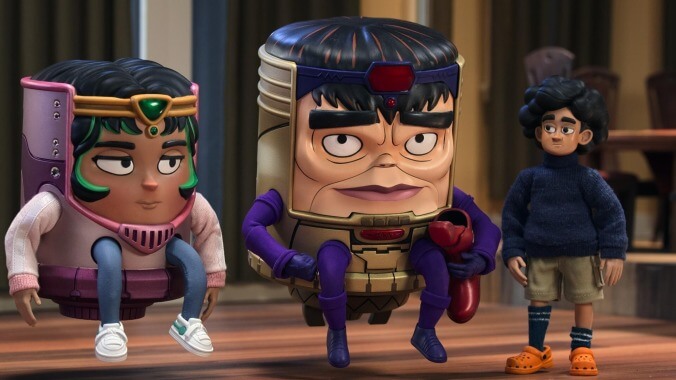If anything, M.O.D.O.K. is more in line with the absurdist character-based humor of something like American Dad! or Rick And Morty, where instead of being a bunch of nonsense where nothing matters, it’s a bunch of nonsense that takes itself seriously. Some of the Marvel stuff is used to set up jokes that comic fans will appreciate more than others (famously annoying villain Arcade shows up and shouts “I hope you like being confused!” while laying out his needlessly complicated evil scheme, which is perfect), but that comes more from the show emphasizing a playful take on what these iconic characters are like more than just trying to score points with the nerds.
Nowhere is any of that clearer than with M.O.D.O.K. himself, voiced here by series co-creator Patton Oswalt (a role that he was born to play, if there’s a way to say that without it sounding like an insult). This version of M.O.D.O.K. is petty and small and bitter over the fact that life hasn’t given him what he thinks he deserves, specifically the entire world, but he does have a wife (Aimee Garcia as Jodie), two kids (Melissa Fumero and Ben Schwartz as Melissa and Lou, respectively), and a loyal robot servant (Jon Daly as the Super-Adaptoid). The family is an obvious parody of slob husband sitcoms, with M.O.D.O.K. being a horrible head-guy in a flying chair while his wife and son are normal, but the smart twist on it is that M.O.D.O.K.’s daughter (who is also a big head in a flying chair) isn’t treated any differently because of her resemblance to her father. A lazier show would make a point to say that it’s okay that Melissa’s different just so it could get away with making jokes about how different she is, but M.O.D.O.K. uses her to further underline that this is a comic book universe and that simply acknowledging comic book stuff isn’t a replacement for hand-crafted jokes.
Speaking of, it should also be noted that M.O.D.O.K. happens to be very funny. There’s a good episode where M.O.D.O.K. is barred from the cool supervillain nightclub (frequented by notable baddies like Madame Masque and Mr. Sinister) because he’s a screw-up, so he drowns his sorrows at The Bar With No Name and befriends some of the other loser villains of the Marvel universe. There’s another joke that involves M.O.D.O.K.’s wife Jodie being asked to dress up as “Latina icon” Carmen Sandiego, plus a fun running gag about the many interchangeable AIM goons kind of having their own names and personalities (including one guy who is eventually revealed to have a comparatively normal husband).
If there’s a downside to the show taking its silliness seriously, it’s that things can drag a bit when M.O.D.O.K. has to deal with its overarching plots, which involve new corporate owners taking over M.O.D.O.K.’s terrorist organization AIM and a time-displaced younger version of M.O.D.O.K. trying to further undermine his future-self’s disastrous family life. It’s not that either of those plots is actively bad, but the show isn’t as funny when it has to move pieces on the board and drive through storylines that none of the characters are even all that invested in. That’s part of the joke, certainly, since M.O.D.O.K. is so self-obsessed that he doesn’t care who is taking over AIM; he just cares that someone is bossing him and his beehive suit-wearing goons around. There’s too much actual plot to get through for that kind of joke to really land, though.
But, thankfully, the mythology episodes (if you want to call them that) make up a small part of M.O.D.O.K., and they only stick out because everything else is so much more fun. The show is just a really solid piece of comedy, from the writing, to the animation of the toy-like characters, to the (naturally) Easter egg-filled background gags, and it shows how malleable the superhero genre is once you accept the fact that people don’t need to be carefully guided through a comic book universe anymore. The Marvel movies are often at their best when they twist a superhero story into the shape of a different genre, and it’s about time that TV similarly embraced the cool things that can be done with comic books if you just shut up and let them be as weird as M.O.D.O.K. is.

